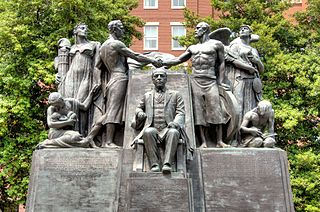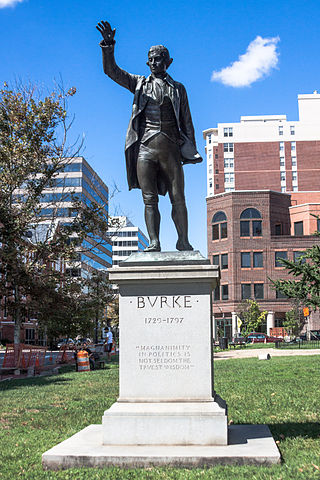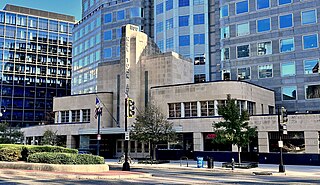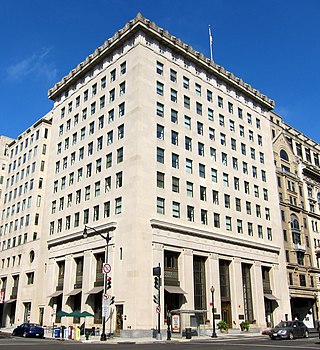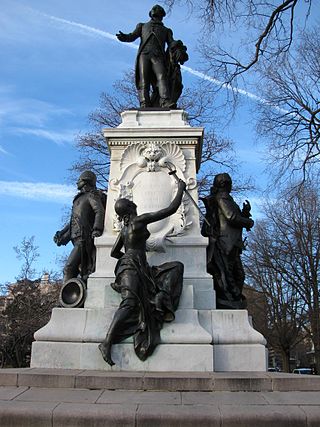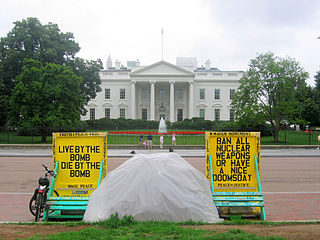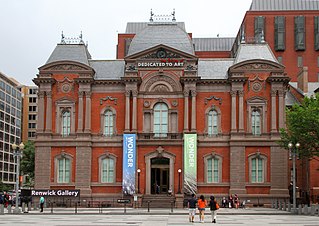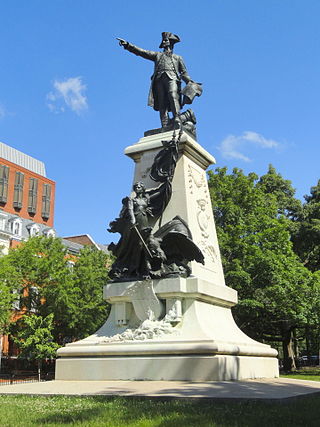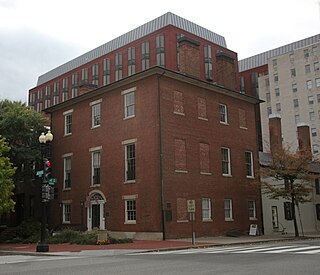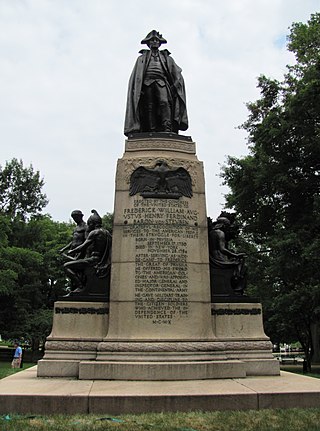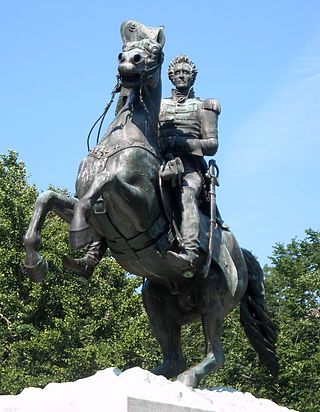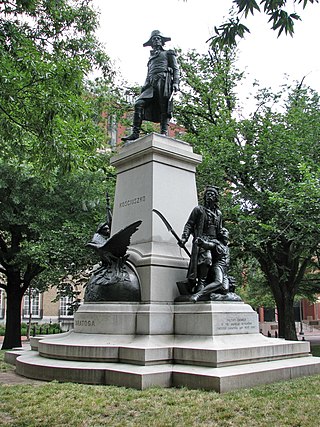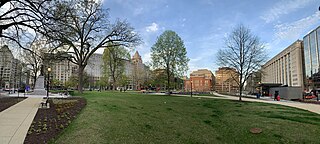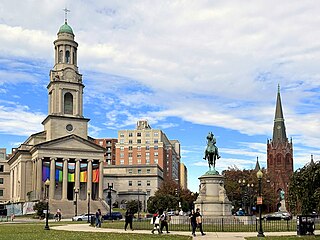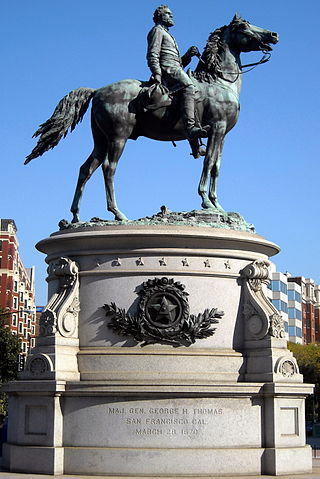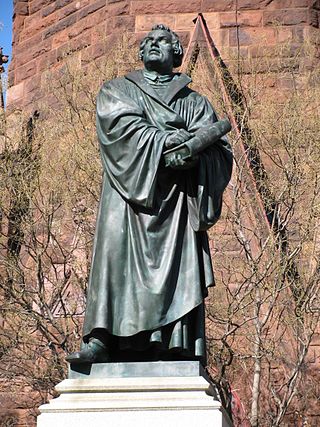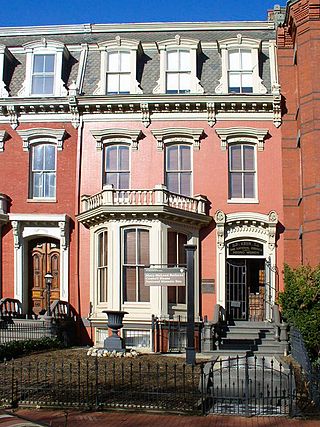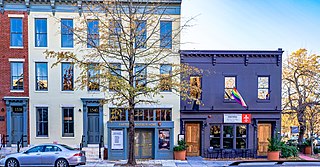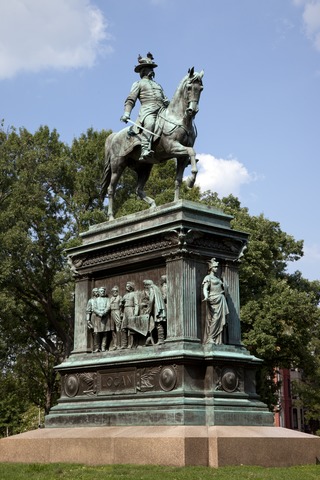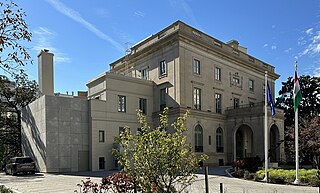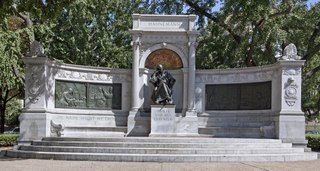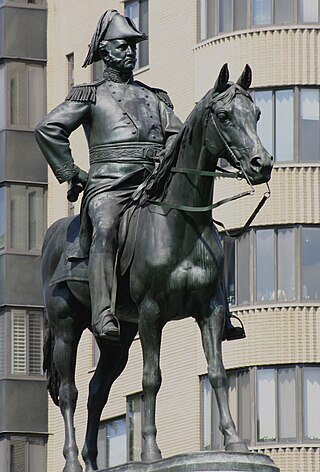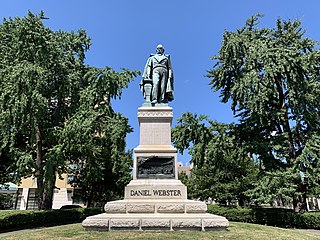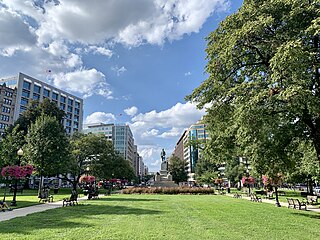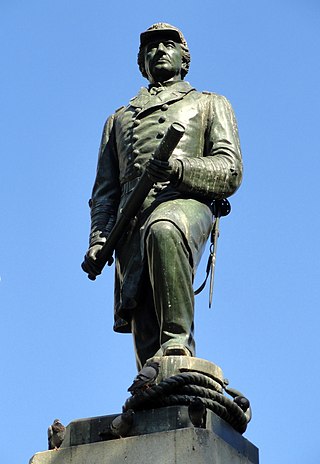Self-guided Sightseeing Tour #7 in Washington, United States
Legend
Tour Facts
7.8 km
177 m
Experience Washington in United States in a whole new way with our free self-guided sightseeing tour. This site not only offers you practical information and insider tips, but also a rich variety of activities and sights you shouldn't miss. Whether you love art and culture, want to explore historical sites or simply want to experience the vibrant atmosphere of a lively city - you'll find everything you need for your personal adventure here.
Individual Sights in WashingtonSight 1: Rigo Walled Park
Rigo Walled Park is a neighborhood-named urban open space located on National Park Service property south of New York Avenue at L Street, NW in the Mount Vernon Square neighborhood of Washington, D.C. It is administered as part of the National Mall and Memorial Parks.
Sight 2: Samuel Gompers Memorial Park
The Samuel Gompers Memorial is a bronze collection of statues in Washington, D.C., sited on a triangular park at the intersection of 11th Street, Massachusetts Avenue, and N Street NW. Samuel Gompers was an English-born American who grew up working in cigar factories, where he witnessed the long hours and dangerous conditions people experienced in factory jobs. He helped with growing the Cigar Makers' International Union, and a few years later, founded the American Federation of Labor (AFL). The number of members rose from 50,000 to 3,000,000 during his time as president of the union. He was not only successful in expanding the power of the labor movement, but also increased its prestige.
Sight 3: Edmund Burke Statue
Edmund Burke is a bronze, full-length statue of British statesman, author, orator, political theorist, and philosopher Edmund Burke by British artist James Havard Thomas. The original statue is in Bristol, England, with a second cast in Washington, D.C. The statue in Washington, D.C., stands in Burke Park, at the intersection of 11th Street, L Street, and Massachusetts Avenue NW, on the southern border of the Shaw neighborhood. The statue was a gift from the Charles Wakefield, 1st Viscount Wakefield, on behalf of the Sulgrave Institution, an organization that wanted to celebrate United Kingdom–United States relations. One way the group did this was by exchanging statues and busts between the two countries.
Sight 4: Old Greyhound Bus Terminal
The Old Greyhound Terminal was a bus terminal serving Greyhound Lines located at 1100 New York Avenue NW in Northwest, Washington, D.C. in the United States operating from 1940 to the 1980s. It was used extensively during World War II to transport servicemen, and played a minor role in the Civil Rights Movement. It was saved through the intervention of preservationists. Most of the building was incorporated in the new 1100 New York Avenue high-rise office building when it was built in 1991.
Sight 5: Commercial National Bank
Commercial National Bank is an historic structure located in Downtown Washington, D.C. It was listed on the National Register of Historic Places in 1991.
Sight 6: Major General Lafayette
Major General Marquis Gilbert de Lafayette is a statue in the southeast corner of Lafayette Square, in Washington, D.C., near the intersection of Pennsylvania Avenue and Madison Place, across the street from the White House. The statue was erected in 1891 to honor Gilbert du Motier, Marquis de Lafayette, and his contributions in the American Revolutionary War. The square, originally part of the President's Park, was named in honor of the Marquis in 1824 during a visit he made to the U.S. The statuary was made by Alexandre Falguière and Antonin Mercié, and the architect who designed the marble pedestal was Paul Pujol. The monument comprises a bronze statue of the Marquis de Lafayette about 11 ft (3.4 m) high, standing on a French marble pedestal with four faces decorated with classical mouldings, accompanied by seven additional bronze statues, all larger than life size.
Wikipedia: Statue of the Marquis de Lafayette (Washington, D.C.) (EN)
Sight 7: White House Peace Vigil
The White House Peace Vigil is an anti-nuclear weapons peace vigil started by William Thomas in 1981. Thomas believed it to be the longest running uninterrupted anti-war protest in U.S. history.
Sight 8: Renwick Gallery
The Renwick Gallery is a branch of the Smithsonian American Art Museum located in Washington, D.C. that displays American craft and decorative arts from the 19th to 21st century. The gallery is housed in a National Historic Landmark building that was opened in 1859 on Pennsylvania Avenue and originally housed the Corcoran Gallery of Art. When it was built in 1859, it was called "the American Louvre", and is now named for its architect James Renwick Jr.
Sight 9: Major General Rochambeau
Major General Comte Jean de Rochambeau is a bronze statue honoring Jean-Baptiste Donatien de Vimeur, comte de Rochambeau, a French nobleman and general who played a major role in helping the Thirteen Colonies win independence during the American Revolutionary War. Rochambeau joined the French military as a teenager, participating in the War of Austrian Succession, after which he was promoted to colonel, and the Seven Years' War. During the war in America, Louis XVI asked Rochambeau to lead a force of 5,500 French soldiers to assist the fight against the Kingdom of Great Britain. He and George Washington later worked together in the successful siege of Yorktown. He led the Army of the North during the French Revolutionary Wars, but was arrested and almost executed during the Reign of Terror. His military rank was restored by Napoleon and Rochambeau died a few years later in 1807.
Sight 10: Decatur House
Decatur House is a historic house museum at 748 Jackson Place in Washington, D.C., the capital of the United States. It is named after its first owner and occupant, the naval officer Stephen Decatur Jr. Built in 1818, the house is located at the northwest corner of Lafayette Square, about a block from the White House.
Sight 11: Major General von Steuben
Major General Friedrich Wilhelm von Steuben is a bronze statue of Friedrich Wilhelm von Steuben, a Prussian soldier who assisted the Thirteen Colonies during the American Revolutionary War. Steuben had fought in previous wars, earning promotions until he assisted in the courts of Frederick the Great and later Josef Friedrich Wilhelm, Prince of Hohenzollern-Hechingen. After meeting with Benjamin Franklin, and fearing for his safety in Europe after alleged homosexual behavior, Steuben and his associates arrived to help the Continental Army.
Sight 12: Andrew Jackson
Andrew Jackson is a bronze equestrian statue by Clark Mills mounted on a white marble base in the center of Lafayette Square within President's Park in Washington, D.C., just to the north of the White House. Jackson is depicted dressed in military uniform, raising his hat with his right hand, while controlling the reins with his left hand as his horse rises on its rear legs.
Wikipedia: Equestrian statue of Andrew Jackson (Washington, D.C.) (EN)
Sight 13: Brigadier General Kosciuszko
Brigadier General Thaddeus Kościuszko is a bronze statue honoring Polish military figure and engineer Tadeusz Kościuszko. The sculpture was dedicated in 1910, the third of four statues in Lafayette Square, Washington, D.C., to honor foreign-born heroes of the American Revolutionary War. Born in the Polish–Lithuanian Commonwealth in 1746, Kościuszko later received education at a Jesuit school before attending the Corps of Cadets in Warsaw. He later traveled to France where he studied in military academy libraries and adopted views of human liberty during the Age of Enlightenment. He moved to the Thirteen Colonies in 1776, where the war with the Kingdom of Great Britain had already begun. Kościuszko served as an engineer in the Continental Army, earning the praise of his superiors, including General George Washington.
Wikipedia: Statue of Tadeusz Kościuszko (Washington, D.C.) (EN)
Sight 14: Major General James B. McPherson
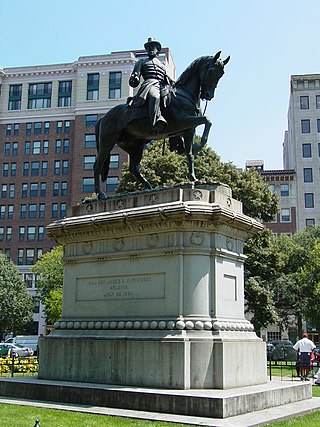
Major General James B. McPherson is a public artwork by American artist Louis Rebisso, located at McPherson Square in Washington, D.C., United States. Major General James B. McPherson was originally surveyed as part of the Smithsonian's Save Outdoor Sculpture! survey in 1993. The monument is a bronze equestrian statue of Civil War hero James B. McPherson. The statue is a contributing monument to the Civil War Monuments in Washington, DC, of the National Register of Historic Places.
Sight 15: McPherson Square
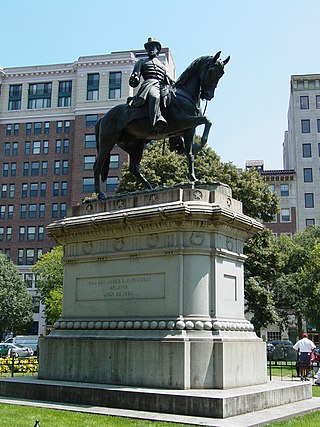
McPherson Square is a public square in downtown Washington, D.C. It is bound by K Street Northwest to the north, Vermont Avenue NW on the East, I Street NW on the south, and 15th Street NW on the West; it is one block northeast of Lafayette Park. It is the sister square of Farragut Square two blocks west. It is served by the McPherson Square station of the Washington Metro.
Sight 16: Franklin Square
Franklin Square, or Franklin Park, is a square in downtown Washington, D.C. Purportedly named after Benjamin Franklin, it is bounded by K Street NW to the north, 13th Street NW on the east, I Street NW on the south, and 14th Street NW on the west. It is served by the McPherson Square station of the Washington Metro, which is located just southwest of the park.
Sight 17: Thomas Circle
Thomas Circle is a traffic circle in Northwest Washington, D.C., United States. It is located at the intersection of 14th Street, M Street, Massachusetts Avenue, and Vermont Avenue NW. A portion of Massachusetts Avenue travels through a tunnel underneath the circle. The interior of the circle includes the equestrian statue of George Henry Thomas, a Union Army general in the Civil War.
Sight 18: Major General George Thomas Statue
Major General George Henry Thomas, also known as the Thomas Circle Monument, is an equestrian sculpture in Washington, D.C. that honors Civil War general George Henry Thomas. The monument is located in the center of Thomas Circle, on the border of the downtown and Logan Circle neighborhoods. It was sculpted by John Quincy Adams Ward, best known for his work on the statue of George Washington in Wall Street, Manhattan. Attendees at the dedication in 1879 included President Rutherford B. Hayes, Generals Irvin McDowell, Philip Sheridan, and William Tecumseh Sherman, senators and thousands of soldiers.
Sight 19: Martin Luther Statue
The Luther Monument is a public artwork located in front of Luther Place Memorial Church in Washington, D.C., United States. The monument to Martin Luther, the theologian and Protestant Reformer, is a bronze, full-length portrait. It is a copy of the statue created by Ernst Friedrich August Rietschel as part of the 1868 Luther Monument in Worms, Germany. The version in Washington, D.C., inspired the installation of many other castings across the U.S. The statue is a contributing property to the Luther Place Memorial Church's listing on the National Register of Historic Places (NRHP) and District of Columbia Inventory of Historic Sites (DCIHS). It is also a contributing property to the Greater Fourteenth Street Historic District, which is also listed on the NRHP and DCIHS.
Sight 20: Mary McLeod Bethune Council House
The Mary McLeod Bethune Council House National Historic Site preserves the house of Mary McLeod Bethune, located in Northwest Washington, D.C., at 1318 Vermont Avenue NW. National Park Service rangers offer tours of the home, and a video about Bethune's life is shown. It is part of the Logan Circle Historic District.
Wikipedia: Mary McLeod Bethune Council House National Historic Site (EN)
Sight 21: Carter G. Woodson Home National Historic Site
Carter G. Woodson Home National Historic Site at 1538 9th Street NW, in the Shaw neighborhood of Washington, D.C., preserves the home of Carter G. Woodson (1875–1950). Woodson, the founder of Black History Month, was an African-American historian, author, and journalist.
Wikipedia: Carter G. Woodson Home National Historic Site (EN)
Sight 22: Major General John A. Logan Monument
Major General John A. Logan, also known as the General John A. Logan Monument and Logan Circle Monument, is an equestrian statue in Washington, D.C., that honors politician and Civil War general John A. Logan. The monument is sited in the center of Logan Circle, a traffic circle and public park in the Logan Circle neighborhood. The statue was sculpted by artist Franklin Simmons, whose other prominent works include the Peace Monument and statues in the National Statuary Hall Collection. The architect of the statue base was Richard Morris Hunt, designer of prominent buildings including the Metropolitan Museum of Art in New York City and The Breakers in Newport, Rhode Island. Prominent attendees at the dedication ceremony in 1901 included President William McKinley, members of his cabinet, Senator Chauncey Depew, Senator Shelby Moore Cullom, and General Grenville M. Dodge.
Sight 23: Brodhead-Bell-Morton Mansion
The Brodhead-Bell-Morton Mansion, also known as the Levi P. Morton House is a historic Beaux-Arts home, located at 1500 Rhode Island Avenue, Northwest, Washington, D.C., in the Logan Circle neighborhood.
Sight 24: Hahnemann Monument
The Samuel Hahnemann Monument, also known as Dr. Samuel Hahnemann, is a public artwork dedicated to Samuel Hahnemann, the founder of homeopathy. It is located on the east side of Scott Circle, a traffic circle in the northwest quadrant of Washington, D.C. The Classical Revival monument consists of an exedra designed by architect Julius Harder and a statue sculpted by Charles Henry Niehaus, whose works include the John Paul Jones Memorial in Washington, D.C., and several statues in the National Statuary Hall Collection. The monument is significant because Hahnemann is the first foreigner not associated with the American Revolution to be honored with a sculpture in Washington, D.C.
Sight 25: Lieutenant General Winfield Brevet Scott Statue
Brevet Lt. General Winfield Scott is an equestrian statue in Washington, D.C., that honors career military officer Winfield Scott. The monument stands in the center of Scott Circle, a traffic circle and small park at the convergence of 16th Street, Massachusetts Avenue and Rhode Island Avenue NW. The statue was sculpted by Henry Kirke Brown, whose best-known works include statues of George Washington in New York and Nathanael Greene in Washington, D.C. It was the first of many sculptures honoring Civil War generals that were installed in Washington, D.C.'s traffic circles and squares and was the second statue in the city to honor Scott.
Sight 26: Daniel Webster Memorial
The Daniel Webster Memorial is a monument in Washington, D.C., honoring U.S. statesman and lawyer Daniel Webster. It is located near Webster's former house, beside Scott Circle, at the intersection of Massachusetts Avenue, N Street, and Rhode Island Avenue NW. The person who commissioned the memorial was Stilson Hutchins, founder of The Washington Post, who greatly admired Webster. Congress approved the memorial in 1898 and the dedication ceremony took place in January 1900. Amongst the attendees at the ceremony were President William McKinley and his cabinet, members of Congress, and Supreme Court justices.
Sight 27: Nuns of the Battlefield Civil War Nurses Monument
Nuns of the Battlefield is a public artwork made in 1924 by Irish artist Jerome Connor, located at the intersection of Rhode Island Avenue NW, M Street, and Connecticut Avenue NW, in Washington, D.C., United States. A tribute to the more than 600 nuns who nursed soldiers of both the Union Army and the Confederate States Army during the American Civil War, it is one of two monuments in the District that mark women's roles in the conflict. It is a contributing monument to the Civil War Monuments in Washington, D.C., listed on the National Register of Historic Places. In 1993, it was surveyed for the Smithsonian Institution's Save Outdoor Sculpture! program.
Sight 28: Farragut Square
Farragut Square is a city square in Washington, D.C.'s Ward 2. It is bordered by K Street NW to the north, I Street NW to the south, on the east and west by segments of 17th Street NW, and interrupts Connecticut Avenue NW. It is the sister park of McPherson Square two blocks east. It is serviced by two stops on the Washington Metro rail system: Farragut North on the Red Line and Farragut West on the Blue, Orange, and Silver Lines.
Sight 29: Admiral David G Farragut
Admiral David G. Farragut is a statue in Washington, D.C., honoring David Farragut, a career military officer who served as the first admiral in the United States Navy. The monument is sited in the center of Farragut Square, a city square in downtown Washington, D.C. The statue was sculpted by female artist Vinnie Ream, whose best-known works include a statue of Abraham Lincoln and several statues in the National Statuary Hall Collection. The monument was dedicated in 1881 in an extravagant ceremony attended by President James A. Garfield, members of his cabinet, and thousands of spectators. It was the first monument erected in Washington, D.C., in honor of a naval war hero.
Share
How likely are you to recommend us?
Disclaimer Please be aware of your surroundings and do not enter private property. We are not liable for any damages that occur during the tours.
GPX-Download For navigation apps and GPS devices you can download the tour as a GPX file.
